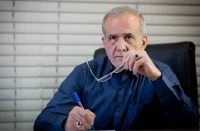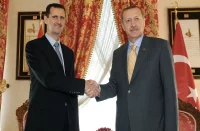Yuriy Lamin (Russia)
In May, 2010 the successive Review Conference on fulfillment of the Nuclear Non-Proliferation Treaty (NPT) was held in the UN Headquarters, New York. It repeatedly raised the question concerning the future of the Treaty in the light of problems and contradictions accumulated during 40 years which are especially acute between the Western developed states led by USA and numerous developing nations.
The main statements of the NPT
The Nuclear Non-Proliferation Treaty was opened for signing on July, 1, 1968 and was enacted on March, 5, 1970. Now it is signed by almost all the states but the related arguments do not calm. The Treaty consists only of 11 articles but it is one of the cornerstone international agreements in the field not only of nuclear non-proliferation but also the peaceful use of the atomic energy.
According to the NPT 5 countries which produced and tested nuclear weapons before the beginning of 1967, namely, the USA, USSR, Great Britain, France and People’s Republic of China, were officially declared nuclear states. These states were committed not to transfer the nuclear weapons or other nuclear explosives to other countries as well as not to help them, not to encourage or push them towards production of such weaponry or facilities. Article 6 of the Treaty emphasizes that all parties to the NPT should conduct negotiations regarding measures on stopping the nuclear arms race and nuclear disarmament.
As for non-nuclear states, signing this treaty they took voluntary obligations not to receive, create or acquire the nuclear weapons or other nuclear explosives. Meanwhile article 4 of the NPT directly states that “no provision of this Treaty can be explained as limiting the unalienable right of all the parties to the Treaty to research, produce and use the atomic energy for peaceful purposes without discrimination”. For denial of the nuclear weapons non-nuclear states were actually guaranteed the access to exchange of equipment, materials, scientific and technical information concerning the use of the atomic energy for peaceful purposes, i.e. everything that can provide development of peaceful atomic programs.
In order not to violate these rights on peaceful use of nuclear technologies and at the same time to impose commitments on non-proliferation of the nuclear weapons the NPT imparted the existing International Atomic Energy Agency (IAEA) with controlling functions through the system of special agreements on guarantees signed by the states and IAEA. These guarantee agreements allow the IAEA to control that non-nuclear states do not use nuclear materials for military purposes.
To increase control all parties to the Treaty should not to provide original or special fissile materials to any state that does not have the nuclear weapons for peaceful purposes if this original or special fissile material is not covered by the guarantees. This ban also includes materials and facilities which are specially targeted or prepared for processing, use or production of a special fissile material. Therefore, non-nuclear states can buy or receive fissile materials and special equipment from the parties to the NPT only after signing the guarantee agreement with the IAEA.
Non-universality of the Treaty
From the very beginning the Nuclear Non-Proliferation Treaty generated ambiguous assessments and arguments. For example, India which was actively developing its own nuclear military program but had not managed to conduct nuclear tests before January, 1, 1967 declared about discriminatory nature of the Treaty. According to the Indian side as well as to some other states 5 permanent members of the UN Security Council chose an occasional date to define who can and who cannot possess nuclear weapons, instead of movement towards the universal nuclear disarmament the Treaty envisaged imparity of states. As a result, during the past 40 years countries have not succeeded in universality of the Treaty, i.e. its signing by all the states.
Nowadays 4 UN members are not a part of the NPT. From the very beginning Israel, India and Pakistan refused to adhere to it, and the Korean People’s Democratic Republic left the Treaty. One could mention that by that time all these 4 countries had already become unofficial nuclear states, i.e. according to the NPT they could not be regarded as states possessing the nuclear weapons but in fact they are nuclear powers.
Non-universality of the Treaty and existence of 4 unofficial nuclear states undermines the foundation of all the nuclear weapons non-proliferation regime. In this background signing of so called “nuclear transaction” between Washington and Delhi concerning the US-India cooperation in the nuclear sphere seems even more interesting. Thank to this agreement the Indian side received the opportunity to buy nuclear materials and technologies which it could not openly acquire abroad before because it did not sign the NPT and is not going to deny the nuclear weapons. In order to evade the existing restrictions India agreed to divide its nuclear program in the military and civilian and placed the latter under the IAEA guarantees. Then this nuclear agreement was approved by the Nuclear Suppliers Group under the USA pressure and due to increasing influence of India, although this alliance was created in 1974 just after the Indian nuclear test in order to improve control over supplies of nuclear materials and equipment.
Following this trick there are more speeches concerning the opportunity of signing a large agreement on the atomic energy between China and Pakistan. China became a member of the Nuclear Suppliers Group only some years ago and it has close economic and military connections with Pakistan. It is not a secret that during the last 3 decades the Pakistani nuclear program has been developed largely thank to the Chinese assistance, and China has already built and is building nuclear reactors in Pakistan but now it has an opportunity for more large-scale and open cooperation. The People’s Republic of China is known to build two new reactors in Pakistan and it is not the end.
As regards Israel, its nuclear program is absolutely beyond the IAEA control; thank to support of the USA it has been protected against checks and any international sanctions for decades.
Thus, there is a paradox situation: on the one hand Iran which signed the Treaty and fulfills its commitments according to the NPT faces new and new international sanctions only for suspicions that it has military component of the nuclear program, on the other hand other states, non-members of the NPT have been possessing serious nuclear arsenals for many years and do not have big problems due to this fact.
Contradictions of the Western and developing states
In current circumstances contradictions regarding 3 key issues, namely, non-proliferation of the nuclear weapons, use of atomic energy for peaceful purposes and nuclear disarmament, between the group of developing states and the group of the Western developed states headed by the USA has become more apparent. The contradictions are based on the fact that the USA together with allies try to reach even more strict non-proliferation regime that starts to directly contradict the rights of all the states for development of their peaceful atomic programs stipulated by the NPT.
The USA and EU insist on increasing control over atomic programs of states which do not have nuclear weapons and even on limitation of their rights for creation of the complete nuclear fuel cycle in some countries etc. It is explained by the fact that the existing system of international control of the IAEA cannot guarantee full revealing of clandestine military nuclear programs any more. However one should notice that despite some real drawbacks of the control system, nevertheless, it has proved its efficiency and until now no state has created the nuclear weapons being within the NPT framework and under long-term IAEA control.
Many developing states have their claims to the USA and Europe since they consider they actions as leading to attempts to increase imparity and brake their scientific-technical and economic development. The developed countries were repeatedly criticized because they hinder exchange of equipment, materials, technologies and cooperation in the field of peaceful use of the atomic energy that violates article 4 of the Treaty. Moreover, the developing countries always remind that 40 years have passed since the NPT was enacted but its article 6 was not almost fulfilled and the nuclear states do not strive for complete nuclear disarmament.
Due to all these problems the previous 2005 Review Conference on fulfillment of the NPT almost led to failure, i.e. that time the states could not agree upon a single important issue and even did not confirm their commitments taken at previous conferences.
Today all these contradictions are especially apparent on the example of arguments concerning the Iranian nuclear program. The US attempts to make Iran deny its rights for creation of complete nuclear fuel cycles face total misunderstanding on behalf of the majority of developing state; it is not surprising that such states as Brazil, Turkey etc. strongly support the Iranian right. The Non-Aligned Movement, the international organization which includes more than 100 states of Asia, Africa, Europe and Latin America, always supports the right of Iran to develop the atomic energy and enrich uranium independently.
American and Israeli intimidations to Iran create bigger problems, thus, according to Robert Gates, the American Defense Secretary, the US new nuclear doctrine does not exclude an opportunity to attack Iran. But one of the main additions to the NPT includes the UN Security Council Resolutions 255, 984 and some declarations of official nuclear powers in which they guarantee non-nuclear states security against aggression with use of the nuclear weapons. Not to mention the fact that according to the UN Charter all arguments should be resolved by peaceful means and all the UN members should abstain form use and threats of use of force; the definition of aggression adopted by the UN General Assembly states that “No considerations of any nature, whether political, economic, military or other, can justify aggression”.
It is natural that these and other unilateral US and its allies attempts to tackle only the problems of non-proliferation without their connection with disarmament and equal access of all the states to the atomic energy frequently made by threats or resorting to force only stalemate the situation. The alternative future of the Nuclear Non-Proliferation Treaty depends on whether the compromise concerning 3 main issues between the Western and developing states is reached. At the successive Review Conference conducted in May the parties to the NPT managed to agree on the final document which calls for creation of the nuclear weapons free area in the Middle East, increasing control over nuclear materials, confirmation of commitments concerning nuclear disarmament etc. However even these statements required big diplomatic efforts because contradictions between the states are in force, there are large well-grounded doubts that calls and wishes envisaged in the final document would be put into practice.
Source: East-West Review














Theres a lot of hypocrisy among the western nations, particularly the US and Israel regarding nuclear issues. This hypocrisy is dangerous for global security. US double standards prevail for Iran and Israel. Does the west want nuclear monopoly over both civilian and military nuclear programs?
I think there is no future for the NPT. IAEA just cannot guarantee a future with western meddling.